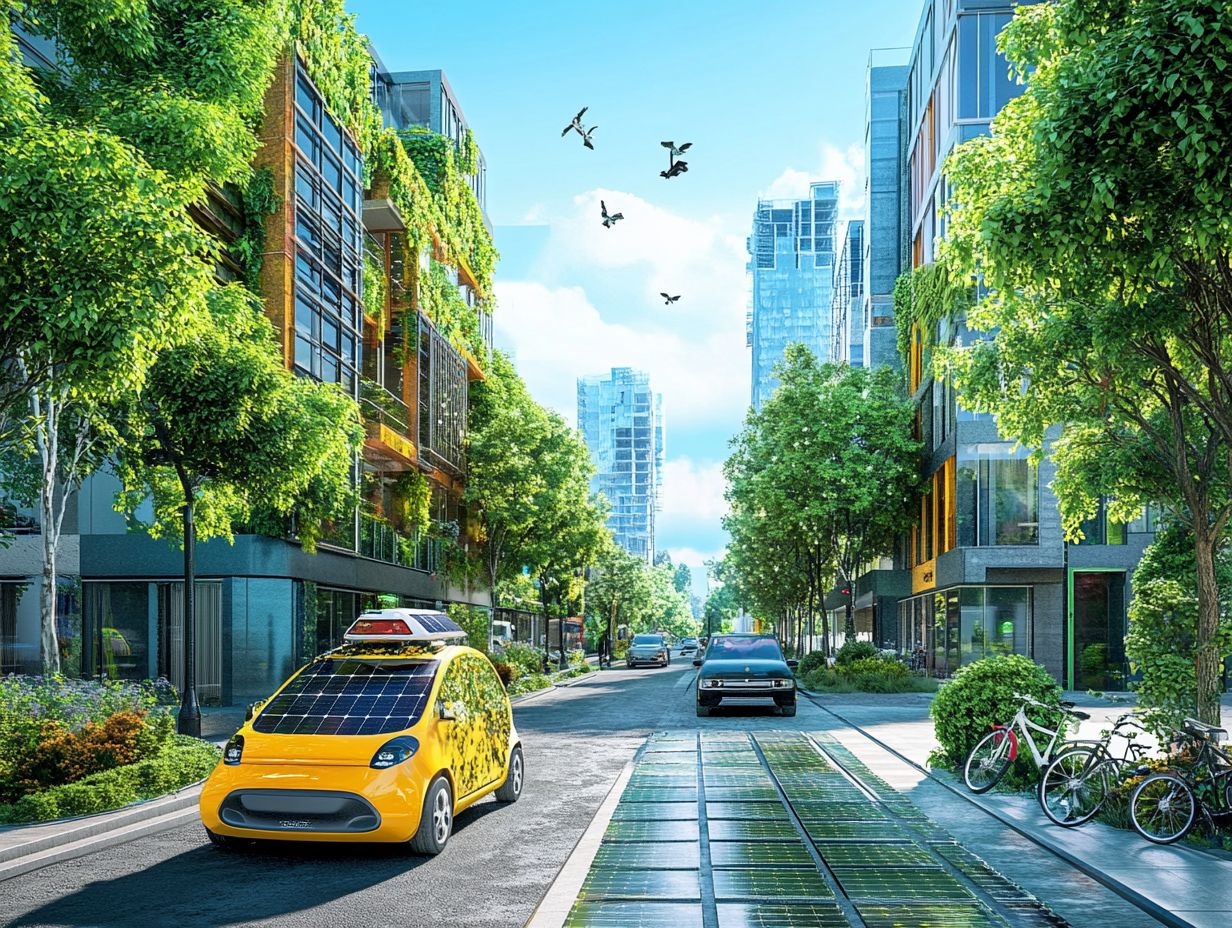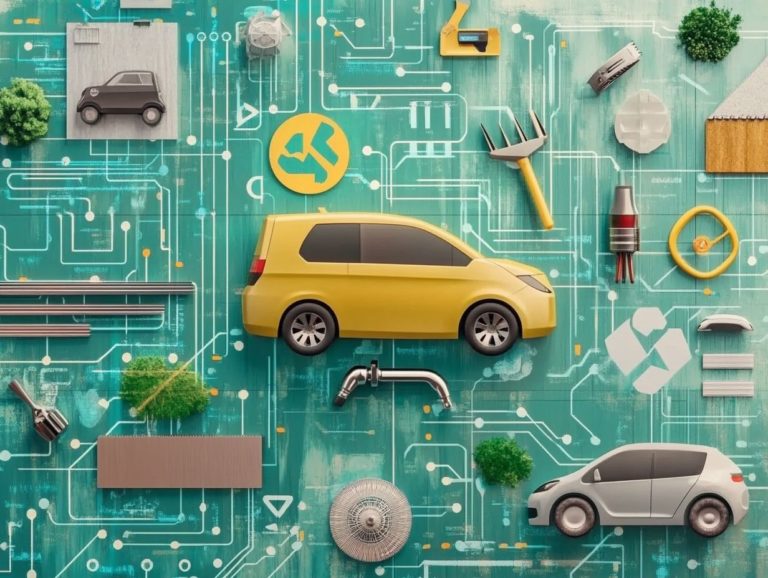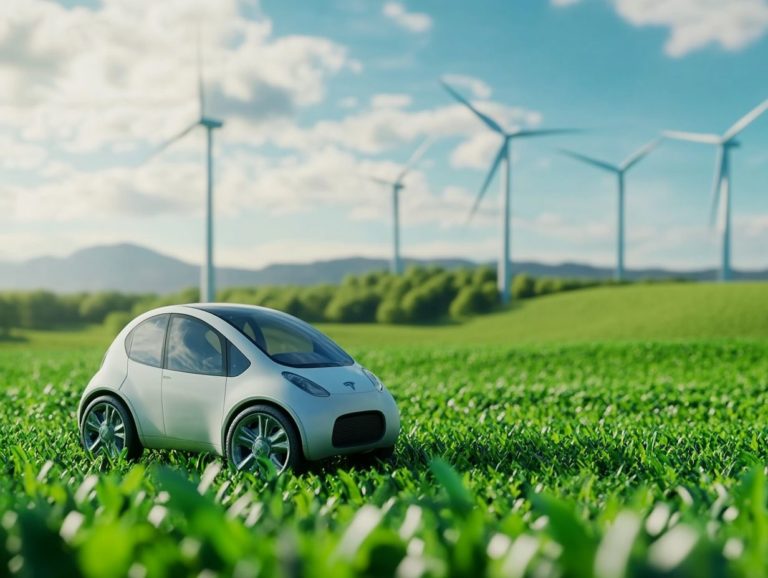The Future of Sustainable Mobility and Electric Vehicles
As the world navigates the complexities of climate change and urban congestion, sustainable mobility is emerging as a crucial solution.
This article delves into the transformative potential of electric vehicles (EVs) in fostering greener, more efficient transportation systems.
You ll explore the significant environmental advantages and economic savings that EVs offer, while also addressing the challenges tied to infrastructure and accessibility. Both sides of the EV landscape are examined to provide a comprehensive view.
Innovations in battery technology, supportive government policies, and initiatives are reshaping the future of sustainable mobility.
Discover how electric vehicles can propel you toward a more sustainable future.
Contents
- Key Takeaways:
- Benefits of Electric Vehicles
- Challenges of Electric Vehicles
- Innovations in Sustainable Mobility
- Government Initiatives and Policies
- Frequently Asked Questions
- What is sustainable mobility and why is it important for the future?
- How are electric vehicles contributing to sustainable mobility?
- What are some challenges facing the future of sustainable mobility and electric vehicles?
- How is the government promoting the use of electric vehicles for sustainable mobility?
- What are some benefits of sustainable mobility and electric vehicles for individuals?
- How can individuals contribute to the future of sustainable mobility and electric vehicles?
Key Takeaways:

- Electric vehicles offer significant environmental benefits, reducing carbon emissions and improving air quality. They are a key solution for sustainable mobility in the future.
- Challenges such as limited infrastructure and high costs hinder the widespread adoption of electric vehicles. However, advancements in battery technology and integration with renewable energy sources are driving innovation in the industry.
- Government initiatives and policies, such as incentives and regulations, play a crucial role in promoting sustainable mobility and electric vehicle adoption. They are shaping the future of transportation toward a more sustainable and eco-friendly direction.
Defining Sustainable Mobility
Sustainable mobility represents a transportation model designed to cut carbon emissions while ensuring equitable access to transportation, in line with Sustainable Development Goal 11. This approach weaves together various modes of transport public transit, private vehicles, and shared mobility to create a comprehensive framework that addresses climate change and urban planning challenges.
By embracing innovative solutions like a system that lets you easily access different types of transport from one app, you can help foster cleaner, more efficient transportation systems that prioritize environmental impact and economic sustainability.
Adopting shared mobility options, such as car-sharing and bike-sharing programs, enables urban areas to reduce dependence on private vehicles. This effectively alleviates traffic congestion and lowers vehicle emissions.
When cities implement mobility-as-a-service platforms, you benefit from a streamlined user experience that provides seamless access to multiple transport modes through a single digital interface. This simplifies your travel process and promotes alternatives like public transit or electric scooters.
This shift nurtures sustainable travel habits among residents and helps mitigate urban sprawl. It fosters denser, more vibrant communities that are better equipped to withstand the challenges of climate change.
Take inspiration from cities like Amsterdam and Medell n, which have successfully integrated these principles, achieving reduced pollution levels and improved public health outcomes as a result of their commitment to sustainable mobility strategies.
Benefits of Electric Vehicles
Electric vehicles (EVs) offer an array of advantages that can profoundly affect the environment. By significantly reducing carbon emissions, they play a crucial role in fostering economic sustainability through lower operational costs.
As zero-emission vehicles, EVs contribute to a cleaner atmosphere by harnessing renewable energy and utilizing clean fuels. This exciting approach could revolutionize transportation for generations to come.
Join the movement toward sustainable mobility today!
Environmental Impact
The environmental impact of electric vehicles is nothing short of remarkable. By significantly reducing carbon emissions compared to traditional combustion engine vehicles, you become an essential player in the fight against climate change.
When you choose to utilize renewable energy sources, EVs transform into a pivotal element in achieving a sustainable transportation model. This reduction in emissions is vital for enhancing air quality, making urban areas healthier for everyone.
Since electric vehicles operate with zero tailpipe emissions, they directly diminish harmful pollutants that lead to respiratory diseases. Integrating EVs into the larger renewable energy landscape not only amplifies the benefits of solar and wind power but also promotes infrastructure development focused on sustainability.
By advocating for cleaner transportation options, zero-emission vehicles encourage a shift toward energy independence, effectively reducing reliance on fossil fuels and aligning with global targets to mitigate climate impacts.
Economic Savings
Electric vehicles present an impressive opportunity for you to achieve significant economic savings thanks to their lower maintenance costs and the potential for reduced fuel expenses.
This financial edge is a vital step toward promoting sustainability in the transportation sector as the charging infrastructure continues to improve.
By choosing electricity over gasoline, you could save a fortune on fuel costs, especially as energy prices become more stable. The low maintenance expenses come from the fact that electric vehicles have fewer moving parts and experience less wear and tear, leading to less frequent repairs and servicing.
Many governments offer financial incentives, such as tax credits or rebates, which makes switching easier. As the charging infrastructure continues to develop and become more accessible, your confidence in using electric vehicles will grow.
This collective advancement not only aids your personal budgeting efforts but also contributes to broader environmental benefits, creating a win-win scenario for both you and the planet.
Challenges of Electric Vehicles

Even with the myriad benefits electric vehicles offer, you ll find that several challenges still loom. These challenges mainly focus on infrastructure and range limitations that can impede widespread adoption.
To pave the way for a more seamless transition to electric mobility, it’s essential to tackle issues related to battery technology, accessibility, and the adequacy of charging infrastructure. Addressing these concerns now is crucial to unlock the full potential of electric vehicles in sustainable transportation on your journey.
Infrastructure and Range Limitations
One of the primary challenges you face with electric vehicles is the infrastructure and range limitations, commonly referred to as range anxiety. This is the nagging fear of running out of battery before you reach your destination.
Advancements in charging infrastructure and battery technology are crucial for broader EV adoption. The current scarcity of widespread charging stations can make long journeys feel daunting, as convenient access to fast chargers remains limited in many areas.
Expanding these networks will not only boost your confidence but also encourage you and many others to embrace electric models. Breakthroughs in battery technology, like solid-state batteries, promise higher energy capacity and faster charging times, effectively tackling those pesky range limitations.
These innovations are essential for building a more robust ecosystem for electric vehicles, ensuring that you feel secure and have confidence in your decision to transition from gasoline-powered cars to electric transportation.
Explore electric vehicles today and be part of the change!
Cost and Accessibility
High upfront costs can deter you from adopting electric vehicles, even if the long-term savings are tempting. To make EVs a viable option for more people, we need to enhance accessibility through better charging infrastructure and attractive financial incentives.
You may hesitate to invest in an electric vehicle due to that initial financial commitment, which often exceeds that of traditional gasoline-powered cars. The lack of substantial government incentives or rebates can amplify this uncertainty, making you wary of such a significant investment.
To overcome these challenges, we should expand charging stations in both urban and rural areas. This expansion would alleviate any range anxiety you might experience and create a more welcoming environment for prospective EV owners. Pairing this with innovative money-saving programs, such as tax breaks and low-interest financing, could significantly enhance affordability and accessibility, ultimately fostering a more eco-conscious consumer base.
Innovations in Sustainable Mobility
Innovations in sustainable mobility are reshaping transportation. Groundbreaking advancements in battery technology and smart traffic management are key to enhancing efficiency and minimizing environmental impact, particularly highlighted in the role of electric vehicles in sustainable development.
As these developments unfold, along with a strong commitment to renewable energy, you find yourself on the brink of experiencing self-driving cars that will redefine how you move.
Advancements in Battery Technology
Advancements in battery technology are key to making your electric vehicle experience amazing! Innovations significantly enhance capacity, longevity, and charging efficiency. When combined with the intersection of EVs and renewable energy integration and improved charging infrastructure, these technologies are paving the way for sustainable mobility.
For example, breakthroughs in solid-state batteries promise higher energy densities and faster charging times, which can greatly boost your electric vehicle’s performance. The growing focus on battery recycling initiatives targets environmental concerns and reduces the need for raw materials, making the entire lifecycle of battery use more sustainable.
As these cutting-edge technologies continue to evolve, they not only improve the practicality of electric vehicles but also create a seamless connection to renewable energy sources. Furthermore, understanding the role of public transportation in EV sustainability paves the way for a greener and more efficient energy ecosystem, benefiting everyone involved.
Integration with Renewable Energy Sources

The integration of electric vehicles with renewable energy sources is crucial for creating a truly sustainable mobility ecosystem. This approach allows for the use of clean fuels while significantly reducing carbon emissions. Understanding why EVs are crucial for a sustainable future enhances the appeal of EVs and contributes to a cleaner environment.
By utilizing energy from solar, wind, and other renewable sources, you can charge your vehicle with power that is both sustainable and cost-effective. This collaboration strengthens the charging infrastructure and encourages the development of smart grid systems that optimize energy use, further reducing your reliance on fossil fuels.
As electric vehicles gain traction, these combined efforts are essential to ensure a significant reduction in greenhouse gas emissions, ultimately fostering a healthier planet for future generations.
Government Initiatives and Policies
Government initiatives and policies are vital in fostering your transition to electric vehicles. They offer valuable incentives and regulations that encourage your shift toward sustainable mobility. These efforts are not just beneficial; they are crucial in the fight against climate change and in promoting cleaner transportation options.
Embracing these advancements means contributing to a greener future while enjoying the benefits of innovative, eco-friendly travel.
Act now to take advantage of available incentives!
Incentives for Electric Vehicle Adoption
Incentives for electric vehicle adoption, like government subsidies and tax rebates, play a pivotal role in making EVs financially accessible to a broader audience. These initiatives are exciting because they make EVs affordable for everyone!
By reducing the upfront costs tied to electric vehicles, these programs ease financial concerns for potential buyers. Many regions provide utility incentives or rebates for home charging installation. This enhances convenience and motivates consideration of electric mobility.
Perks like lower registration fees and access to carpool lanes significantly elevate the appeal of owning an EV. Through these various forms of financial support, governments are committed to helping you transition to cleaner energy solutions, ultimately paving the way for a more sustainable future in transportation.
Regulations for Sustainable Mobility
Regulations surrounding electric vehicles are crucial for ensuring that government policies effectively promote sustainable mobility while reducing greenhouse gas emissions. These rules set the standards for electric cars and the places where you can charge them.
By implementing stringent vehicle emissions standards, authorities motivate manufacturers to innovate and develop cleaner technologies, benefiting the environment. Safety regulations also enhance vehicle designs to ensure that they are not only efficient but also safe for consumers.
Infrastructure requirements, such as the installation of charging stations, are essential for encouraging widespread adoption, making electric vehicles more accessible to everyone. Collectively, these regulations play a significant role in climate change mitigation efforts, reducing dependence on fossil fuels, promoting renewable energy use, and supporting a transition towards cleaner urban mobility solutions.
Frequently Asked Questions
What is sustainable mobility and why is it important for the future?

Sustainable mobility refers to transportation methods that have minimal negative impact on the environment and society. It is important for the future because it helps reduce carbon emissions, promotes cleaner air, and decreases our dependence on non-renewable resources.
How are electric vehicles contributing to sustainable mobility?
Electric vehicles are powered by electricity, which means they emit zero emissions while driving. This makes them a much more eco-friendly alternative to traditional gasoline-powered vehicles, contributing to sustainable mobility.
What are some challenges facing the future of sustainable mobility and electric vehicles?
One of the main challenges is the lack of infrastructure for charging electric vehicles. This includes the availability of charging stations and the time it takes to charge a vehicle. Additionally, the cost of purchasing an electric vehicle is still relatively high compared to traditional vehicles.
How is the government promoting the use of electric vehicles for sustainable mobility?
Many governments around the world are offering incentives and subsidies for the purchase of electric vehicles. They are also implementing policies to increase the number of charging stations and investing in research and development for more affordable and efficient electric vehicles.
What are some benefits of sustainable mobility and electric vehicles for individuals?
Sustainable mobility and electric vehicles can save individuals money on fuel costs, as electricity is generally cheaper than gasoline. They also offer a smoother and quieter driving experience, and with advancements in technology, they are becoming more accessible and convenient for everyday use. To learn more about this, check out future trends in electric vehicles.
How can individuals contribute to the future of sustainable mobility and electric vehicles?
Individuals can contribute by choosing to purchase and use electric vehicles, using public transportation or carpooling when possible, and advocating for government policies that support sustainable mobility. Small actions like these can make a big difference in creating a more sustainable future for transportation. Now is the perfect time to consider making the switch to electric vehicles; don’t miss out on the growing importance of EV sustainability and the benefits it brings!





